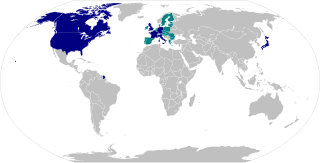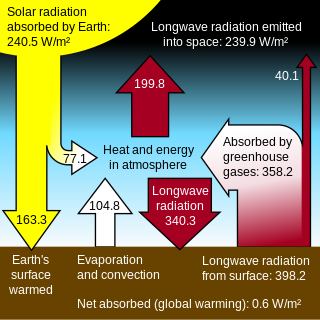Global warming potential (GWP) is a measure of how much heat a greenhouse gas traps in the atmosphere up to a specific time horizon, relative to carbon dioxide. It compares the amount of heat trapped by a certain mass of the gas in question to the amount of heat trapped by a similar mass of carbon dioxide and is expressed as a factor of carbon dioxide.
Globalization or globalisation is the process of interaction and integration among people, companies, and governments worldwide. As a complex and multifaceted phenomenon, globalization is considered by some as a form of capitalist expansion which entails the integration of local and national economies into a global, unregulated market economy. Globalization has grown due to advances in transportation and communication technology. With the increased global interactions comes the growth of international trade, ideas, and culture. Globalization is primarily an economic process of interaction and integration that's associated with social and cultural aspects. However, conflicts and diplomacy are also large parts of the history of globalization, and modern globalization.

Climate change occurs when changes in Earth's climate system result in new weather patterns that last for at least a few decades, and maybe for millions of years. The climate system is comprised of five interacting parts, the atmosphere (air), hydrosphere (water), cryosphere, biosphere, and lithosphere. The climate system receives nearly all of its energy from the sun, with a relatively tiny amount from earth's interior. The climate system also gives off energy to outer space. The balance of incoming and outgoing energy, and the passage of the energy through the climate system, determines Earth's energy budget. When the incoming energy is greater than the outgoing energy, earth's energy budget is positive and the climate system is warming. If more energy goes out, the energy budget is negative and earth experiences cooling.

The G8, reformatted as G7 from 2014 due to the suspension of Russia's participation, was an inter-governmental political forum from 1997 until 2014.
3G, short for third generation, is the third generation of wireless mobile telecommunications technology. It is the upgrade for 2G and 2.5G GPRS networks, for faster internet speed. This is based on a set of standards used for mobile devices and mobile telecommunications use services and networks that comply with the International Mobile Telecommunications-2000 (IMT-2000) specifications by the International Telecommunication Union. 3G finds application in wireless voice telephony, mobile Internet access, fixed wireless Internet access, video calls and mobile TV.

Tinariwen is a Grammy Award-winning group of Tuareg musicians from the Sahara Desert region of northern Mali. The band was formed in 1979 in Tamanrasset, Algeria, but returned to Mali after a cease-fire in the 1990s. The group first started to gain a following outside the Sahara region in 2001 with the release of The Radio Tisdas Sessions, and with performances at Festival au Désert in Mali and the Roskilde Festival in Denmark. Their popularity rose internationally with the release of the critically acclaimed Aman Iman in 2007. NPR calls the group "music's true rebels", AllMusic deems the group's music "a grassroots voice of rebellion", and Slate calls the group "rock 'n' roll rebels whose rebellion, for once, wasn't just metaphorical".

The Gulfstream G550 is a business jet aircraft produced by General Dynamics' Gulfstream Aerospace unit in Savannah, Georgia, US. The certification designation is GV-SP. There were 450 Gulfstream G550s in active service as of January 2016. A version with reduced fuel capacity was marketed as the G500.
A global city, also called world city or sometimes alpha city or world center, is a city which is a primary node in the global economic network. The concept comes from geography and urban studies, and the idea that globalization is created, facilitated, and enacted in strategic geographic locales according to a hierarchy of importance to the operation of the global system of finance and trade.

The Group of Seven (G7) is a group consisting of Canada, France, Germany, Italy, Japan, the United Kingdom, and the United States. These countries, with the seven largest IMF-described advanced economies in the world, represent 58% of the global net wealth ($317 trillion). The G7 countries also represent more than 46% of the global gross domestic product (GDP) based on nominal values, and more than 32% of the global GDP based on purchasing power parity. The European Union is also represented at the G7 summit.

The NatureServe conservation status system, maintained and presented by NatureServe in cooperation with the Natural Heritage Network, was developed in the United States in the 1980s by The Nature Conservancy (TNC) as a means for ranking or categorizing the relative imperilment of species of plants, animals, or other organisms, as well as natural ecological communities, on the global, national and/or subnational levels. These designations are also referred to as NatureServe ranks, NatureServe statuses, or Natural Heritage ranks. While the Nature Conservancy is no longer substantially involved in the maintenance of these ranks, the name TNC ranks is still sometimes encountered for them.

The G20 is an international forum for the governments and central bank governors from 19 countries and the European Union. Founded in 1999 with the aim to discuss policy pertaining to the promotion of international financial stability, the G20 has expanded its agenda since 2008 and heads of government or heads of state, as well as finance ministers and foreign ministers, have periodically conferred at summits ever since. It seeks to address issues that go beyond the responsibilities of any one organization.

Global warming is a long-term rise in the average temperature of the Earth's climate system, an aspect of climate change shown by temperature measurements and by multiple effects of the warming. Though earlier geological periods also experienced episodes of warming, the term commonly refers to the observed and continuing increase in average air and ocean temperatures since 1900 caused mainly by emissions of greenhouse gasses in the modern industrial economy. In the modern context the terms global warming and climate change are commonly used interchangeably, but climate change includes both global warming and its effects, such as changes to precipitation and impacts that differ by region. Many of the observed warming changes since the 1950s are unprecedented in the instrumental temperature record, and in historical and paleoclimate proxy records of climate change over thousands to millions of years.
The G8 Climate Change Roundtable was formed in January 2005 at the World Economic Forum in Davos, Switzerland. Its purpose was to address the global climate change issue facing governments, business and civil society. The first meeting was held in Gleneagles, Scotland, from 6–8 July 2005, to coincide with the 31st G8 summit.

A greenhouse gas is a gas that absorbs and emits radiant energy within the thermal infrared range. Greenhouse gases cause the greenhouse effect. The primary greenhouse gases in Earth's atmosphere are water vapor, carbon dioxide, methane, nitrous oxide and ozone. Without greenhouse gases, the average temperature of Earth's surface would be about −18 °C (0 °F), rather than the present average of 15 °C (59 °F). The atmospheres of Venus, Mars and Titan also contain greenhouse gases.

5G is a commonly used term for certain advanced wireless systems. Industry association 3GPP defines any system using "5G NR" software as "5G", a definition that came into general use by late 2018. Others may reserve the term for systems that meet the requirements of the ITU IMT-2020, which represents more nations. 3GPP will submit their 5G NR to the ITU. It follows 2G, 3G and 4G and their respective associated technologies
The legal and cultural expectations for date and time representation vary between countries, and it is important to be aware of the forms of all-numeric calendar dates used in a particular country to know what date is intended.
Lamida buruensis is a species of snout moth in the genus Lamida. It is known from Buru, Indonesia, from which its species epithet is derived.
Lamida moncusalis, the cashew shoot and blossom webber, is a species of snout moth in the genus Lamida. It was described by Francis Walker in 1859. It is found in India.

Lamida obscura is a species of snout moth in the genus Lamida. It was described by Moore in 1888, and is known from India, China, Taiwan and Japan.












